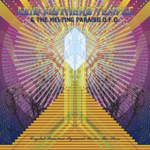|
|
 |
Dusted Reviews
Artist: Acid Mothers Temple and the Melting Paraiso U.F.O Album: Crystal Rainbow Pyramid Under the Stars Label: Important Review date: Jun. 19, 2007 |

|
|
|
 |
Despite myself, despite all my expectations, here I am enjoying yet another Acid Mothers Temple disc; not just reveling in the heavy zap-your-mind speed-freak center-of-the-whirlpool calming mayhem we’ve come to know so well, but actually being pleasantly surprised. The irrepressible Kawabata Makoto and Co. have somehow managed to offer up a slice of the unexpected or two on every recent AMT disc – not an easy task when your discography includes over 30 albums.
Crystal Rainbow Pyramid… opens with the seven-minute “Pussy Head Man from Outer Space,” and even though it’s a typical AMT thrashout, each instrument comes to the fore more clearly than on most previous efforts. The same is true of the twentysomething-minute title track, which morphs through several tempo changes and related drone centers. There are great Kawabata riffs a-plenty, insistent and more heavily reverb’d as things proceed. It becomes clear just how textured most of the disc really is as the track progresses toward a wild conclusion of haze and head-echo.
“Electric Psilocybin Flashback” is stunning, the album’s masterpiece. Stretching out over 40 minutes, it’s a study in dynamic contrast, juxtaposing bouts of ethnically charged electricity with restrained, almost baroque, passages of layered drone, vocals, acoustic guitar and saxophone, courtesy of Ono Ryoko. The sax propels the music toward the avant-garde, forming a bizarre and unsettling dichotomy with the overarching sense of mellow mysticism. Kitigawa Hao’s vocals are gorgeous, heavily vibrato’d and sensitive, rivaling anything Cotton Casino laid down for the group in years past.
The disc ends mystically, with any latent sense of parody in the titles or the music stripped away by subtly effected guitar and tasteful drone. It is impossible to describe the net effect of 40 minutes of modified, carefully crafted buzz and thrum, and the attendant shifts in instrumentation that make this track work so well and its conclusion so powerful. It functions like so many other AMT tracks of similar bent, yet it somehow defies formula. This may not be the best AMT album, and it is certainly not the worst; it is merely the latest from a band whose prolific work ethic over the last 10 years, bordering on insanity, continues to yield fresh results.
By Marc Medwin
|







